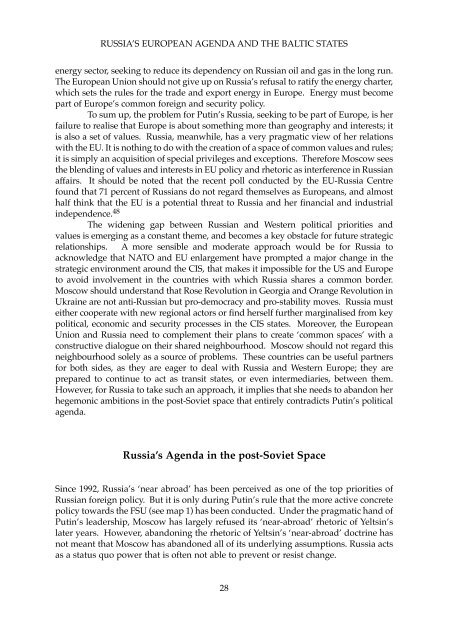Russia's European Agenda and The Baltic States - Defence ...
Russia's European Agenda and The Baltic States - Defence ...
Russia's European Agenda and The Baltic States - Defence ...
Create successful ePaper yourself
Turn your PDF publications into a flip-book with our unique Google optimized e-Paper software.
RUSSIA’S EUROPEAN AGENDA AND THE BALTIC STATES<br />
energy sector, seeking to reduce its dependency on Russian oil <strong>and</strong> gas in the long run.<br />
<strong>The</strong> <strong>European</strong> Union should not give up on Russia’s refusal to ratify the energy charter,<br />
which sets the rules for the trade <strong>and</strong> export energy in Europe. Energy must become<br />
part of Europe’s common foreign <strong>and</strong> security policy.<br />
To sum up, the problem for Putin’s Russia, seeking to be part of Europe, is her<br />
failure to realise that Europe is about something more than geography <strong>and</strong> interests; it<br />
is also a set of values. Russia, meanwhile, has a very pragmatic view of her relations<br />
with the EU. It is nothing to do with the creation of a space of common values <strong>and</strong> rules;<br />
it is simply an acquisition of special privileges <strong>and</strong> exceptions. <strong>The</strong>refore Moscow sees<br />
the blending of values <strong>and</strong> interests in EU policy <strong>and</strong> rhetoric as interference in Russian<br />
affairs. It should be noted that the recent poll conducted by the EU-Russia Centre<br />
found that 71 percent of Russians do not regard themselves as <strong>European</strong>s, <strong>and</strong> almost<br />
half think that the EU is a potential threat to Russia <strong>and</strong> her financial <strong>and</strong> industrial<br />
independence. 48<br />
<strong>The</strong> widening gap between Russian <strong>and</strong> Western political priorities <strong>and</strong><br />
values is emerging as a constant theme, <strong>and</strong> becomes a key obstacle for future strategic<br />
relationships. A more sensible <strong>and</strong> moderate approach would be for Russia to<br />
acknowledge that NATO <strong>and</strong> EU enlargement have prompted a major change in the<br />
strategic environment around the CIS, that makes it impossible for the US <strong>and</strong> Europe<br />
to avoid involvement in the countries with which Russia shares a common border.<br />
Moscow should underst<strong>and</strong> that Rose Revolution in Georgia <strong>and</strong> Orange Revolution in<br />
Ukraine are not anti-Russian but pro-democracy <strong>and</strong> pro-stability moves. Russia must<br />
either cooperate with new regional actors or find herself further marginalised from key<br />
political, economic <strong>and</strong> security processes in the CIS states. Moreover, the <strong>European</strong><br />
Union <strong>and</strong> Russia need to complement their plans to create ‘common spaces’ with a<br />
constructive dialogue on their shared neighbourhood. Moscow should not regard this<br />
neighbourhood solely as a source of problems. <strong>The</strong>se countries can be useful partners<br />
for both sides, as they are eager to deal with Russia <strong>and</strong> Western Europe; they are<br />
prepared to continue to act as transit states, or even intermediaries, between them.<br />
However, for Russia to take such an approach, it implies that she needs to ab<strong>and</strong>on her<br />
hegemonic ambitions in the post-Soviet space that entirely contradicts Putin’s political<br />
agenda.<br />
Russia’s <strong>Agenda</strong> in the post-Soviet Space<br />
Since 1992, Russia’s ‘near abroad’ has been perceived as one of the top priorities of<br />
Russian foreign policy. But it is only during Putin’s rule that the more active concrete<br />
policy towards the FSU (see map 1) has been conducted. Under the pragmatic h<strong>and</strong> of<br />
Putin’s leadership, Moscow has largely refused its ‘near-abroad’ rhetoric of Yeltsin’s<br />
later years. However, ab<strong>and</strong>oning the rhetoric of Yeltsin’s ‘near-abroad’ doctrine has<br />
not meant that Moscow has ab<strong>and</strong>oned all of its underlying assumptions. Russia acts<br />
as a status quo power that is often not able to prevent or resist change.<br />
28

















